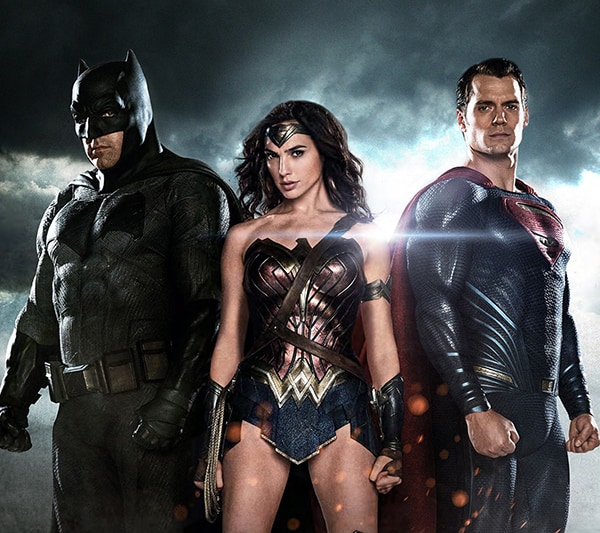
Above: The principal cast of Batman vs Superman, Ben Affleck, Gal Gadot and Henry Cavill in a promotional still for the film.
BitDepth#1035 for April 05, 2016
Batman vs Superman: Dawn of Justice (hereafter BvS) has more than just a verbose name weighing it down, it has the unhappy task of being not just a movie, but the proposal for a cinematic franchise.
It’s as if the young Sean Connery, all taut swagger and alluringly cocky attitude, began his outing as James Bond fully aware that 23 films, two of them out of formal canon, and countless television shows and satirical takes on the idea of a secret agent would depend on how he wore his gray suit, strolled in a swimsuit and even said his own name.
And yet, here we are with BvS, sitting through two and a half hours of people in costumes grimacing at each other and hitting each other quite violently for a cinematic experience that purports to be a movie about Batman and Superman meeting for the first time and having Wonder Woman drop by unexpectely, but turns out to be anything but that.
Movies generally introduce characters, lead them through a story arc of discovery, challenge and redemption, pace the activity with a comprehensible narrative and offer the audience some kind of personal revelation through their identification with the people on the screen.
But what happens when the lead characters are godlike in their aspect?
Superman’s powers and bizarre childhood, as portrayed in Zack Snyder’s version of his life, have left him profoundly disconnected from the humans he lives among. Wonder Woman is apparently immortal and has probably buried more friends than Superman did in the predecessor film, Man of Steel.
And Batman? He’s the most distant of all, a champion of the people who can no longer hear them, only the steady drumbeat of a war he’s been fighting so long it’s become the only reason for his existence.
How do mere actors fare with such unforgiving material? Henry Cavill assays an irritatingly confused Superman while Amy Adams struggles mightily with an underwritten and inconsistent Lois Lane.
More positively, Laurence Fishburne’s Perry White is a painfully resonant newspaper editor, Jeremy Irons lustily ploughs into Alfred Pennyworth with relish and Ben Affleck can barely contain his joy at wearing the batsuit.
Woven into this mad quilt of tight costumes and dizzying violence are the plots of two very different major DC story arcs, the 1992 introduction of Doomsday and its shocking end and The Dark Knight Returns (DKR), Frank Miller’s 1986 hit story of an elder Batman settling old, overdue accounts.
Mr Snyder clearly loves these comics, particular the Batman story, and cherry picks not just plot points and narrative arcs from DKR, he also plunders imagery and dialogue wholesale from that publication.
The final 30 minutes of BvS follow the fourth act of DKR so closely that rereading the old story feels like looking at a 30-year-old storyboard.
It’s hardly the first time that Snyder has been so impressed with a comic that he’s become lost in panel breakdowns. His 2009 Watchmen was so enamored with its source material that it never quite broke free to become a film in its own right, though he had far better success two years earlier with 300.
Other constraints limit the potential of BvS. It’s less a stand-alone film than it is business infrastructure and that makes its financial success a key point to consider.
The film is clearly intended to be the first stake in the ground of an expanded DC cinematic universe, something that rival Marvel has already done.
The haste and desperation to bring something equivalent before an audience makes for rocky introductions to Cyborg, Aquaman and The Flash.
The film’s pacing stutters over clumsy efforts to seed teasers of dramatic coming events, most tacked in as dream sequences that have nothing at all to do with the story at hand, such as it is.
Stripped of all this, there’s the backbone of a decent story in play in BvS, a scheme by Lex Luthor (a manic Jesse Eisenberg) who hates Superman vehemently for undisclosed reasons, to pit the superhumans against each other, thereby fulfilling the unwritten comics rule that when two such heroes meet, they must fight for at least a quarter of the book they appear in.
Unfortunately, a film isn’t a comic. The mediums can influence each other and often do to impressive effect, but their narratives run at different speeds and require vastly different plot dependencies.
Zack Snyder doesn’t understand this particularly well and BvS suffers mightily because of it.
I’ll go out on a limb here and predict that if DC follows through with its plans for a Justice League film and individual flicks for each of the characters still to appear, there will come a day when we look back on BvS and nod with grudging understanding.
There may not be appreciation or melancholy nostalgia, but in hindsight to come, this loud, maddeningly chaotic film might just make sense.

